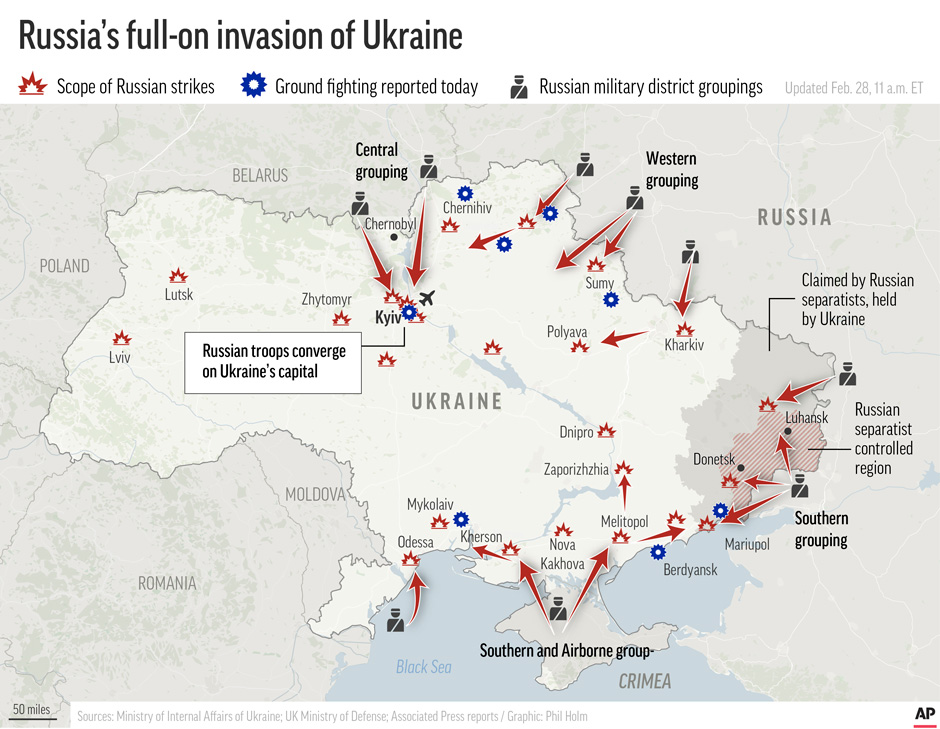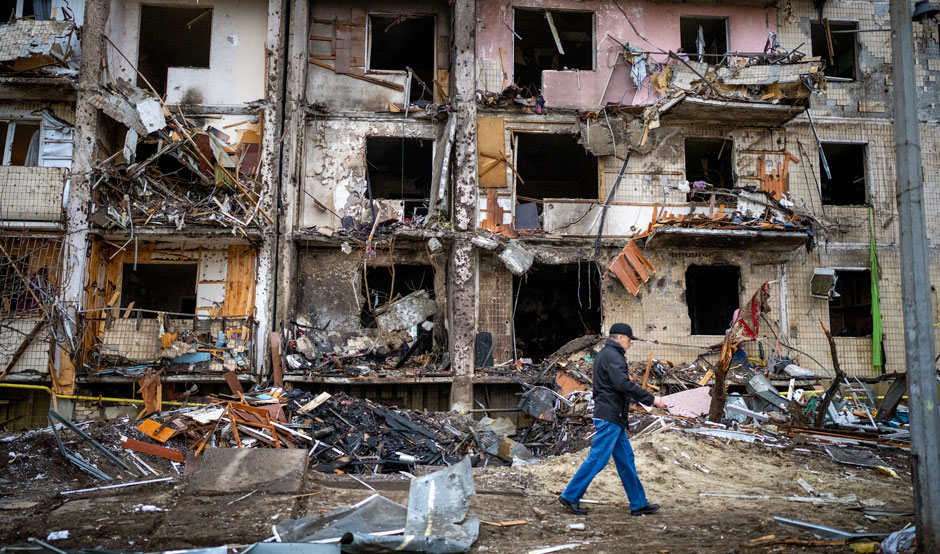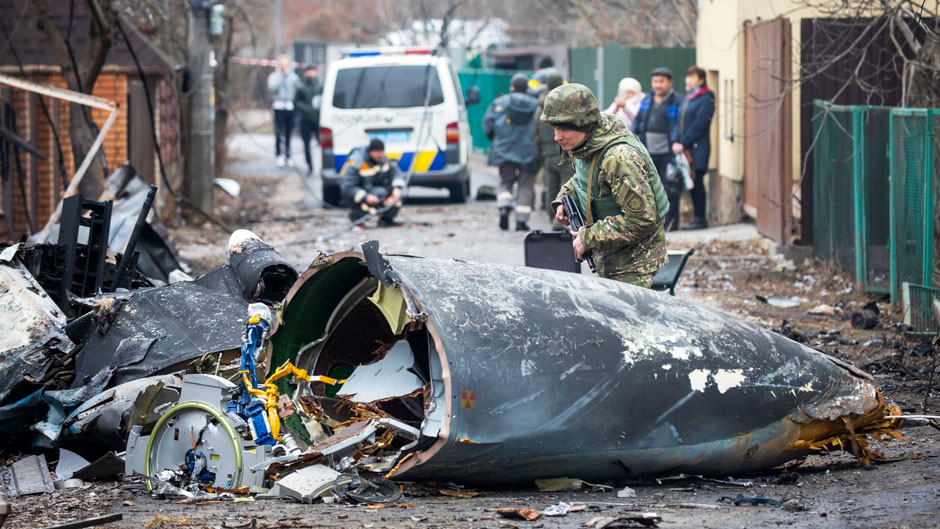As the world scrambles to stymie the Russian invasion of Ukraine that interrupted decades of peace and the post-Cold War security order, several University of Miami Russian policy experts analyzed the motivations driving Russian President Vladimir Putin’s aggression.
“The invasion represents a geopolitical clash between the western and eastern views of the world,” said Dina Moulioukova, an international relations lecturer in the College of Arts and Sciences who grew up in Kazan, a city in southwest Russia.
To fully understand the conflict, Moulioukova said one needs to consider the history of Russia and Ukraine, two nations that were once different republics within the Soviet Union and share many common traits.
“For Russia, Ukraine is the cradle of Slavic civilization. It’s where the Cyrillic alphabet and a Slavic sense of identity emerged, and that’s one reason why the region is so important to Russians,” she added.
Olena Antonaccio, a Ukraine native and criminology professor in the College of Arts and Sciences, added that Kyiv was the center of the first East Slavic state of Kyivan Rus' and Ukrainians are proud of their distinct culture that emerged in that area, centuries before major Russian cities like Moscow were established.
While the history of the largest and second-largest countries in Europe dates back more than 1,000 years, Marcia Beck, a political science lecturer in the College of Arts and Sciences, said a seed for understanding the invasion was planted in early 2000, when Putin categorized the dissolution of the Soviet Union as “the worst catastrophe of the 20th century.”
“So, this begins with his horror at the dissolution, which led to the creation of many independent nations, and his attempts to put it back together again,” said Beck, noting that in his recent speeches Putin made it clear that he considers Ukraine to be part of the Russia family.
Antonaccio agreed, adding that Putin often speaks about restoring “great Russia,” but it is a vision that she and most Ukrainians reject.
“Ukraine lived under hundreds of years of Russian occupation, and people would rather die than live like that again,” said Antonaccio, whose brother is currently working to protect his nation with the civilian defense forces in her home city of Lviv. “Ukrainian people are free and loving. We have been taken over by different empires throughout history, but we always wanted freedom. And now again Russia wants to rob us of that after 30 years of independence.”

While Putin has expressed security concerns and the threat of democratic countries on Russia’s border, these countries and NATO pose no military threat, Beck pointed out.
She suggested that a more personal motivation has to do with the 2014 uprising in the Ukraine that ousted Viktor Yanukovych, the Russia-backed president. The Revolution of Dignity or the “Maidan Revolution,” named for the square in the Ukranian capital where many protests occurred, continues to irk the Russian leader.
“Maidan was a brutal shock for him. He felt personally denigrated by what happened there and he wants to reestablish his legacy,” Beck added.
In retaliation for the ouster, Putin moved to annex Crimea in 2014 and successfully took a chunk of Ukraine. Since then, Ukraine has been in a small-scale war with Russia, Antonaccio said, that became full-scale last week.
George Gonzalez, a political science professor in the College of Arts and Sciences, noted that Putin had warned Ukraine against associating with groups like the North Atlantic Treaty Organization (NATO), a military alliance that promotes democratic governments and includes the United States, Canada, and much of Europe. When NATO was interested in forging a bond with Ukraine recently, it may have seemed like a threat to Russia since Ukraine lies on its border.
“From a military perspective, Russia is concerned that this alliance is now right on its borders. And when Poland was incorporated into NATO, the U.S. agreed not to put forces there," he said. "Then, the U.S. violated that since there are military there now, so Russia feels threatened.”
Beck suggested that the Russian leader’s timing has to do with his perception that the West is disunited and therefore vulnerable.
“Putin is testing the West now, testing Biden, and the German and French leaders. He thought he could win over what he perceived as cracks in the western alliance and their weak resolve,” she said.
Moulioukova and Antonaccio agreed.
“There is a perception in Russia that the United States and Europe are both at a point of political weakness because of the sharp divides in America’s political parties and the Brexit controversy in Europe,” Moulioukova said. “Putin may simply be trying to take advantage of this vulnerable moment to assert Russia’s strength.”
While some have questioned the Russian leader’s rational frame of mind, Beck said that at the start of this latest conflict, Putin was able to blunt rumors of an impending invasion during meetings with some Western leaders.
“He’s played the West incredibly well,” she said. “We’ve been watching this invasion in slow motion and in real time for weeks and still thought nothing was going to happen. It’s the strangest phenomenon I’ve ever experienced.
“The irrational and scary part is that he apparently hasn’t thought about the long-term consequences,” Beck said, especially since the West has finally stepped up to the plate by imposing crushing economic sanctions and sending Ukraine military equipment.
In Russian media, Moulioukova noted, Putin has maintained that he decided to invade Ukraine because he was trying to protect the “brotherhood’’ of Russia—those living in pockets of eastern Ukraine who sympathize with Russia—by alleging that the Ukrainian government had begun shelling them in recent days.

Beck critiqued Russia for waging a “false-flag campaign”—the propaganda war to try and blame Ukraine for provoking the invasion.
“We saw this in Georgia, saw it when the Nazis invaded Poland in 1939—it’s a time-worn war strategy carrying out an operation that makes it seem that the people you want to invade attacked first. We know all this, and yet it happens. And Putin is trying to use it as justification,” Beck said.
Also, Putin’s claim that Ukraine’s government must be toppled because it is full of Neo-Nazis is not true, according to Antonaccio. In the last election, research shows that about 2 percent of the popular electorate supports far right extremist groups, she said, not to mention that President Volodymyr Zelensky—who was elected with 73 percent of the vote—is Jewish.
“We are not a perfect country, but we definitely do not have a Neo-Nazi government or substantial support for Neo-Nazi groups. ... I’m not saying there aren’t any Neo-Nazi groups in Ukraine,” she said, “but there are also such groups in the United States and Russia.”
Beck applauded the U.S. campaign to use its intelligence services to counter Russia’s attempt to win the propaganda war.
“The U.S. government has done a good job getting out in front of this—they’ve publicized intelligence reports that track Russian troop movements and monitor Russian social media to let the world know what Russia is telling their own people—that didn’t happen in 2014,” Beck asserted.
Regardless of Russia’s motivations, people around the world are concerned about the consequences of the ongoing war, Gonzalez noted. The United States and Europe have imposed sanctions on Russia to deter the nation from continued attacks in Ukraine, but those penalties may also paralyze European nations who rely on Russia for oil and gas. In addition, Russia is one of the world’s top producers of oil and with nations no longer trading with them, it is pushing global oil prices up.
“If this crisis continues to escalate, that will be a problem because right now the energy supplies coming out of Russia are disrupted,” said Gonzalez, who studies how energy factors into global foreign policy. “But my thought is that Putin’s military effort is an effort to deter Ukraine from joining NATO.”
This effort may backfire though, Antonaccio said.
“Ukraine is probably now much more likely to join NATO than before, ironically,” she added. “And now other, smaller countries like Finland and Sweden that were neutral will run to NATO.”
Still, while Putin may have underestimated the resistance and resolve of the Ukrainian people, Beck observed, the military outcome is probably already decided.
“Putin can militarily defeat Ukraine—and he will if the West doesn’t somehow stop him. But I don’t believe he has the ability to occupy Ukraine. He would need 1 million soldiers or forces. He is never going to convince Ukrainians to live under Russian occupation,” she said.
“This is going to be a long and protracted fight with very sad consequences if Putin doesn’t come to his senses,” Beck added.

